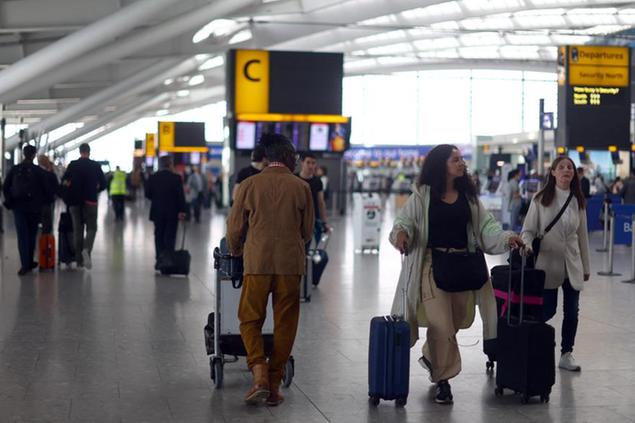(BRUSSELS, BELGIUM) Brussels Airport canceled 110 of its 203 scheduled incoming flights and scrapped every single departure on Wednesday, November 26, 2025, as a sweeping national industrial action over government austerity plans brought one of Europe’s key air hubs to a near standstill and sent disruption rippling across the continent.
Overview of the disruption
The shutdown at the main Belgian gateway came on the final day of a three-day strike running from November 24–26, 2025, called by unions representing security and ground-handling staff. They are protesting government plans to cut public spending by €10 billion by 2030 to comply with European Union debt rules.

With airport security and ramp services deeply affected, airlines had little choice but to cancel flights in advance, paralysing normal operations at Brussels Airport.
Impact at Brussels Airport (26 November 2025)
By mid-morning on November 26, 2025, more than half of all planned arrivals into Brussels Airport had been wiped from the schedule, with 110 of 203 incoming flights canceled. Airport authorities confirmed that all departing flights were also canceled that day.
The cancellations transformed a normally busy hub into a scene of:
- Stranded passengers
- Closed check-in counters
- Blank departure boards
For many travelers, the scale of the stoppage came as a shock, especially those who had expected at least limited services to continue.
Expect overwhelmed service counters and delayed responses during strikes; avoid relying on phone calls and use online chat or app messages to keep your plan flexible.
Brussels South Charleroi Airport also affected
Brussels South Charleroi Airport, a major base for low-cost carriers, also canceled all scheduled departures and arrivals on November 26, 2025, in solidarity with the wider national industrial action and amid the same staffing shortages.
That decision removed another key option for travelers trying to rebook or reroute, further tightening capacity for anyone attempting to travel through Belgium by air.
Quick facts (summary table)
| Airport | Date | Arrivals canceled | Departures canceled |
|---|---|---|---|
| Brussels Airport | 26 Nov 2025 | 110 of 203 incoming flights canceled | All departing flights canceled |
| Brussels South Charleroi Airport | 26 Nov 2025 | All arrivals canceled | All departures canceled |
Ripple effects across Europe
The collapse in Belgium’s air traffic triggered a chain reaction across Europe. Flights between Brussels and several of the continent’s busiest airports were canceled or delayed, forcing airlines to reshuffle aircraft and crew.
Routes hit included links with:
- London Heathrow
- Amsterdam Schiphol
- Barcelona
- Paris
The disruption quickly spread through interconnected schedules, creating knock-on delays for both inbound and outbound flights at other hubs.
Airlines and network impact
Several major carriers were heavily affected:
- British Airways canceled its London Heathrow–Brussels services, removing a key link for business travelers, EU officials, and international passengers connecting through Heathrow to long-haul routes.
- Ryanair, Vueling, easyJet, and KLM faced major schedule changes across Brussels and other European airports, with hundreds of flights canceled or delayed on the same day.
Many aircraft that would normally shuttle between Brussels and other capitals were left parked or reassigned, complicating operations across the network.
The result was hundreds of cancellations and delays across Europe’s busiest airports, affecting thousands of passengers and disrupting both holiday and business travel.
Passenger experiences and practical consequences
The timing meant many people missed family events, conferences, or planned meetings. For travelers with tight schedules or multi-leg journeys, the closures at Brussels Airport and Charleroi turned routine trips into stressful and sometimes costly ordeals.
Although exact numbers are not known, some travelers affected included those:
- Attending embassy appointments
- Beginning new jobs
- Relocating with strict check-in or interview times
Missed connections could push back entry dates, job start times, or move-in plans — especially when tickets are linked to strict schedules.
Rights and advice for affected passengers
Travelers stranded by cancellations on November 26, 2025, were urged to stay in close contact with their airlines rather than heading directly to airports. Carriers advised affected passengers to check for rerouting options, new travel dates, or refunds through official websites and mobile apps, while warning that call centers and airport service desks were overwhelmed.
Under European Union regulations, passengers whose flights were canceled may, in some cases, be entitled to compensation, care, and assistance, depending on the specific circumstances of each disruption. This can include meals, hotel accommodation when necessary, and the choice between re-routing or a refund.
- For official information on passenger rights and how to file claims, see the European Commission’s portal: air passenger rights
- Eligibility often hinges on factors such as:
- When the airline informed passengers of the cancellation
- Whether the airline could reasonably avoid the disruption
Recommended immediate steps for affected travelers:
- Check your carrier’s website and app for updates and rebooking options.
- Seek refunds or rerouting directly through the airline portal.
- Keep receipts for extra expenses (meals, accommodation) in case reimbursement is applicable.
- Review EU passenger-rights rules to determine potential compensation.
Immediately check your airline’s app or website for rebooking or refunds before heading to the airport; update your travel plans quickly and save proof of any new arrangements.
Why the strike happened
The three-day national industrial action reflects strong union resistance to the government’s spending-cut proposals. The plan to trim €10 billion from the budget by 2030 aims to keep Belgium in line with EU fiscal rules but has been met with opposition from workers who say the cuts will hurt public services and employee conditions.
Airport security and ground-handling staff play an essential role in aviation safety and operations; their decision to strike delivered an immediate and visible impact felt beyond Belgium.
Broader implications for Europe’s aviation system
This episode highlights how exposed international travel is to domestic political and economic disputes. Because Brussels Airport feeds traffic into major hubs like Heathrow, Schiphol, Barcelona, and Paris, its near-total shutdown forced airlines to adjust operations across several countries within hours.
Key systemic effects included:
- Aircraft missing positioning flights through Brussels
- Crews unable to operate multiple planned legs
- Interlinked timetables unraveling across carriers
For Europe’s tightly interlinked aviation system, a single domestic industrial action can upset timetables that millions rely on.
Lessons and outlook
For frequent travelers and those with fixed commitments, the events of November 24–26, 2025 in Belgium are a reminder to leave margin in travel plans where possible. Although the strike was announced as a three-day action, many passengers either did not see warnings or hoped their flights would still operate.
If canceled, review EU passenger rights, keep all receipts, and check eligibility for meals, hotel stays, or rebooking compensation via the official EU portal.
Industry observers call the disruptions at Brussels and Charleroi among the most serious interruptions to European air travel in late 2025. With government austerity measures and union resistance at the heart of the dispute, further industrial action cannot be ruled out — though no additional dates had been formally announced within the publicly available information.
For now, airlines, passengers, and airport operators are assessing the operational and financial cost of a day when one of Europe’s key aviation gateways largely fell silent.
A nationwide three-day strike in Belgium halted Brussels Airport on Nov. 26, 2025: 110 of 203 arrivals were canceled and all departures suspended. Brussels South Charleroi mirrored the shutdown. Major carriers adjusted networks, causing extensive cancellations and delays across Europe and stranding thousands. Passengers were advised to seek rerouting, refunds or EU compensation. Authorities, airlines and unions face decisions on operational recovery and the political dispute over €10 billion budget cuts by 2030.








